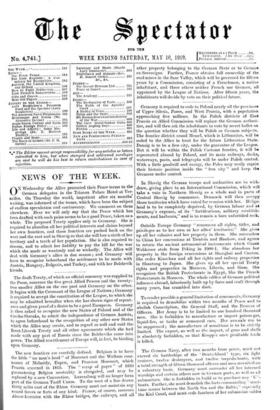The new frontiers are carefully defined. Belgium is to have
the little " no man's land " of Moresnet and the Walloon com- munes of Malmedy, Eupen, and Prussian Moresnet, which Prussia annexed in 1815. The " scrap of paper " of 1830 guaranteeing Belgian neutrality is abrogated, and may be replaced by a new Convention. Luxemburg will no longer form part of the German Tariff Union. To the west of a line drawn thirty miles east of the Rhine Germany must not maintain any alined forces or forts of any kind. France, of course, recovers Alsace-Lorraine with the Rhine bridges, the railways, and all other property belonging to the German State or to German ex-Sovereigns. Further, France obtains full ownership of the coal-mines in the Saar Valley, which will be governed for fifteen years by a Commission, consisting of a Frenchman, a native inhabitant, and three others neither French nor German, all appointed by the League of Nations. After fifteen years, the inhabitants will decide by vote on their political future.






































